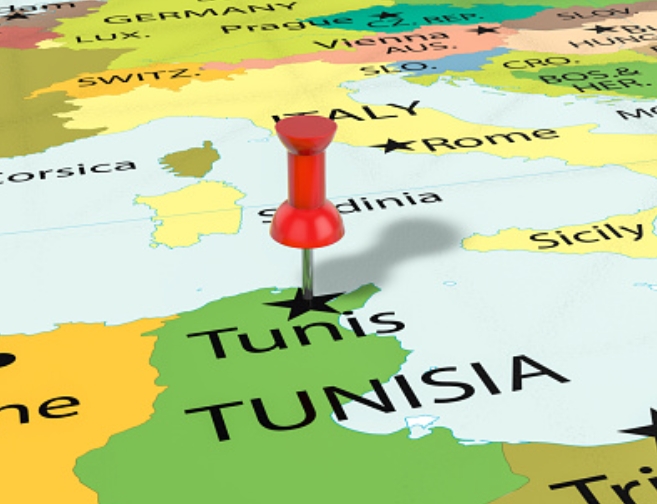Headline
African Foreign Students In Tunisia Fearful After Racist Violence

Thousands of sub-Saharan African students in Tunisia are still fearful after a surge of racist attacks following comments by President Kais Saied against illegal immigration, and are seeking concrete steps to protect them.
The violence erupted after Saied blamed “hordes of illegal migrants from sub-Saharan Africa” for most crime in Tunisia and alleged there was a “criminal plot” to change the nation’s demographic make-up.
At the height of the wave of attacks last month, the “feeling of fear was overwhelming,” said Christian Kwongang, president of AESAT, an association representing sub-Saharan African students in Tunisia.
Amid what witnesses described as a “hunt for blacks”, Kwongang recalled that “we had parents in tears who called us, worried about their children being arrested, with some detained for up to two weeks”.
Kwongang said his group documented more than 20 assaults against students, “including 10 with knives”, and over 400 arrests. For more than two weeks it advised students to stop attending classes and only venture outside in case of emergency.
At least 100 students made emergency repatriations, mostly to Mali, Ivory Coast, Guinea and Niger, said Kwongang, who comes from Cameroon.
READ ALSO: Group Condemns Tunisian Xenophobic, Racial Attacks On African Migrants
“They left because of the wave of racism, arbitrary arrests and numerous cases of evictions” from housing, Kwongang said.
The violence has abated and students returned to classes on March 6. No physical attacks have been recorded since March 7, but “verbal attacks” persist and the foreign students remain on guard, said Kwongang.
“We are in the observation phase,” he said. “And we are waiting to see concrete things — for example, an acceleration in the granting of residence permits.”
– ‘Disaster for Tunisia’ –
The violence was a “disaster for Tunisia”, which had always been “a welcoming place”, said Tahar Ben Lakhdar, director of the private ESPRIT university.
Saied’s comments represent “an enormous smear”, said the 83-year-old, who stressed that they were also entirely unjustified because “which country does not have foreigners in irregular situations?”
Some educational institutions have since implemented new protective measures — including setting up crisis units, bus transport, and having local students accompany sub-Saharan African students.
READ ALSO: Japanese Billionaire Masatoshi Ito Is Dead
Lakhdar said ESPRIT, which specialises in engineering and management courses, has 350 sub-Saharan Africans among its 14,000 students.
He said the university had established “a platform where each student who has a problem can report to dedicated lawyers”.
The government of the North African country has also promised to address the problem.
Malek Kochlef, the Ministry of Higher Education’s director of international coordination, said that “there were some very reprehensible attacks” but claimed that “they were isolated acts”.
He told AFP the ministry had responded by establishing communication units and contact points in each educational establishment to report any incidents.
Authorities have also moved to begin streamlining the granting of residency permits and promised the creation an agency for the reception of foreign students, Kochlef added.
– Long ‘an El Dorado’ –
The violence could harm the private education sector in Tunisia, a small Mediterranean country suffering economic crisis, and deep political divisions since Saied in 2021 dismissed the government and assumed wide-ranging powers.
Sub-Saharan African students make up the “overwhelming majority” of international students in the private education sector and a “significant proportion” at public institutions, Kochlef said.
International student numbers in Tunisia, mostly from other African countries, grew to 9,000 last year, a five-fold increase since 2011.
Kwongang said there were 8,200 sub-Saharan African students at Tunisia’s universities and technical colleges at last count, in 2021.
Ivorian student Paul Andre Moa said Tunisia had long been seen as an “El Dorado, a welcoming land with an excellent education system”.
READ ALSO: Five Migrants Drown In Shipwreck Off Tunisia
It has attracted foreign students with favourable annual tuition fees starting at 3,000 euros (about $3,200), a much lower cost of living and less strict visa requirements than in Europe.
But Kwongang said that, after the announcement of measures to reassure students, AESAT members were now waiting to see what practical effect they will have.
He said students still faced close scrutiny from authorities and from police who are “one day asking for one document, the next day for another”.
Kwongang voiced “great concern” that enrolments will fall as many foreign students now hope to continue their studies “elsewhere, in Europe or Canada” and said he saw Tunisia’s reputation as “severely damaged”.
AFP
Headline
Russia, China Afraid Of US Under My Administration — Trump

United States President, Donald Trump, has said Russia and China fear the United States because of the strength of his administration, arguing that American global influence is driven primarily by its military power and leadership.
Trump, in a post on Truth Social on Wednesday stated that rival powers would not take NATO seriously without the United States, claiming the alliance lacks deterrent force in the absence of American involvement.
He expressed doubts about whether NATO members would come to the aid of the US in a real crisis, despite Washington’s continued commitment to the alliance.
READ ALSO:Trump To Withdraw US From 66 UN, International Organisations
The president credited his leadership with rebuilding the US military during his first term and sustaining its strength, describing this as the key reason adversaries show respect and caution toward the country.
He maintained that America’s military dominance has played a central role in preserving global stability and saving lives.
Trump also argued that his administration forced NATO members to increase defence spending, saying many allies had previously failed to meet financial commitments while relying heavily on the US.
READ ALSO:Insecurity: US Congressman Riley Moore Reveals Trump’s Mission In Nigeria
He added that his actions helped prevent further escalation in Eastern Europe and contributed to the resolution of multiple conflicts.
According to Trump, the United States remains the only nation that commands genuine fear and respect from both Russia and China, a position he attributed to his administration’s approach to defence, diplomacy, and global leadership.
“He wrote partly, “The only Nation that China and Russia fear and respect is the DJT REBUILT U.S.A. MAKE AMERICA GREAT AGAIN!!! President DJT.”
Headline
Trump To Withdraw US From 66 UN, International Organisations

United States President, Donald Trump, has announced plans to withdraw the US from 66 United Nations and international organisations, including key global bodies focused on climate change, peace and democracy.
The decision was disclosed in a presidential memorandum released by the White House on Wednesday evening, following a review of which “organizations, conventions, and treaties are contrary to the interests of the United States.”
According to Trump, the move will see the US end its participation in the affected organisations and cut all related funding.
A list shared by the White House showed that 35 of the organisations are non-UN bodies, including the Intergovernmental Panel on Climate Change (IPCC), the International Institute for Democracy and Electoral Assistance, and the International Union for Conservation of Nature.
READ ALSO:Trump’s Airstrikes: Halt Military Cooperation With US Immediately – Sheikh Gumi Tells Tinubu Govt
Although listed as a non-UN body by the White House, the IPCC is a United Nations organisation that brings together leading scientists to assess climate change evidence and provide periodic reports to guide political leaders.
The memorandum also announced the US withdrawal from 31 UN entities, including the UN Framework Convention on Climate Change (UNFCCC), the UN Democracy Fund, and the UN Population Fund (UNFPA), which focuses on maternal and child health.
Several of the targeted UN bodies are involved in protecting vulnerable groups during armed conflicts, including the UN Office of the Special Representative of the Secretary-General for Children and Armed Conflict.
Reacting to the announcement, UN spokesperson Stephane Dujarric said in a note to correspondents on Wednesday evening that the organisation expected to issue a response by Thursday morning.
Despite repeatedly stating his desire to limit US involvement in UN forums, Trump has continued to exert influence on international decision-making.
READ ALSO:Trump Using FBI To ‘Intimidate’ Congress, US Lawmakers Cry Out
In October last year, he threatened to impose sanctions on diplomats who formally adopted a levy on polluting shipping fuels that had already been agreed to at an earlier meeting, a move that stalled the deal for 12 months.
The Trump administration also sanctioned UN special rapporteur Francesca Albanese after she released a report detailing the role of international and US companies in Israel’s genocidal war on Gaza.
During his first term in 2017, Trump similarly threatened to cut aid to countries that supported a draft UN resolution condemning the US decision to recognise Jerusalem as Israel’s capital.
As a permanent member of the UN Security Council, the US wields significant influence at the United Nations, including veto power, which it has repeatedly used to block efforts to end Israel’s war on Gaza before later mediating a ceasefire.
(Aljazeera)
Headline
UK Supported US Mission To Seize Russian-flagged Oil Tanker – Defense Ministry

The British Ministry of Defence said on Wednesday that it provided support to the United States in its operation to seize a Russian-flagged oil tanker in the North Atlantic.
US seized the tanker, which was being shadowed by a Russian submarine on Wednesday, after pursuing it for more than two weeks across the Atlantic as part of Washington’s efforts to block Venezuelan oil exports.
According to Britain, its armed forces gave pre-planned operational support, including basing following a US request for assistance.
READ ALSO:UK Introduces Powers To Seize Phones, SIM Cards From Illegal Migrants
The UK also said a military vessel provided support for the US forces pursuing the tanker, and the Royal Air Force provided surveillance support from the air.
Defence Secretary John Healey stated that the operation targeted a vessel with a nefarious history linked to Russian and Iranian sanctions evasion networks.
“This action formed part of global efforts to crack down on sanctions busting,” he said in a statement.
READ ALSO:Venezuelan Deportees: US Embassy Gives Reason For Reducing Visa Validity For Nigerians
According to him, the US was Britain’s closest defence and security partner.
“The depth of our defence relationship with the US is an essential part of our security, and today’s seamlessly executed operation shows just how well this works in practice,” he added.
The British government said that the Bella-1 tanker, now renamed Marinera, is sanctioned by the US under its counter-Iran sanctions,
The MoD statement said the support was provided in full compliance with international law.

 News5 days ago
News5 days agoWhat I Saw After A Lady Undressed Herself — Pastor Adeboye

 Headline5 days ago
Headline5 days agoPROPHECY: Primate Ayodele Reveals Trump’s Plot Against Tinubu

 Metro5 days ago
Metro5 days agoArmed Robbers Shot PoS Operator To Death In Edo

 Business4 days ago
Business4 days agoNNPCL Reduces Fuel Price Again

 Metro4 days ago
Metro4 days agoAAU Disowns Students Over Protest

 Metro5 days ago
Metro5 days agoJoint Task Force Kills 23 Bandits Fleeing Kano After Attacks

 Politics5 days ago
Politics5 days ago2027: Rivers APC Pledges To Follow Wike’s Instructions

 Headline2 days ago
Headline2 days agoRussia Deploys Navy To Guard Venezuelan Oil Tanker Chased By US In Atlantic

 Metro4 days ago
Metro4 days agoEdo: Suspected Kidnappers Kill Victim, Hold On To Elder Brother

 Metro4 days ago
Metro4 days agoNine Soldiers Feared Dead In Borno IED Explosion




















